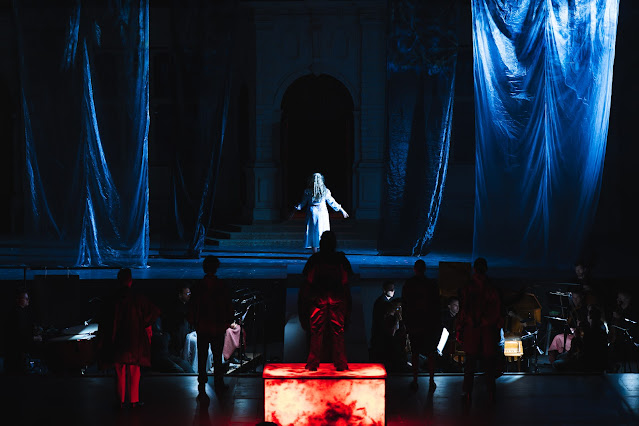 |
| Handel: Semele – Hilary Cronin & ensemble – Waterperry Opera Festival (Photo: Jennifer Hawthorn) |
Handel: Semele; Hilary Cronin, Michael Lafferty, Sophie Goldrrick, Nathan Mercieca, Sarah Winn, director: Rebecca Meltzer, conductor: Bertie Baigent, Waterperry Opera Festival; Opera Holland Park
Reviewed 23 August 2025
A small-scale production with a big heart. Director Rebecca Meltzer tells the story with engaging clarity and benefits from Hilary Cronin charming and delighting in the title role
Having finished its summer performances in Oxfordshire, Waterperry Opera Festival made two guest appearances at Opera Holland Park bringing their new production of Handel’s Semele. We caught the second, on 22 August 2025. The director was Rebecca Meltzer and conductor was Bertie Baigent with Hilary Cronin as Semele, Michael Lafferty as Jupiter, Sophie Goldrick as Juno, Nathan Mercieca as Athamas, Sarah Winn as Ino, Phil Wilcox as Cadmus, Louse Fuller as Iris, James Micklethwaite as Apollo and Masimba Ushe as Somnus and the High Priest. Designs were by Jennifer Gregory, lighting by Catja Hamilton and movement by Alexandria McCauley.
Meltzer’s production took advantage of the full extent of the Opera Holland Park stage even adding a walkway across the middle of the pit. Most of the action was on the forestage with the main stage used for emphasis. Jennifer Gregory’s designs were contemporary, the mortals dressed in shades of black, white and grey with clothes that might have come from Cos, whilst the immortals were in vivid colour with paint on their skin and graffiti-esque clothes.
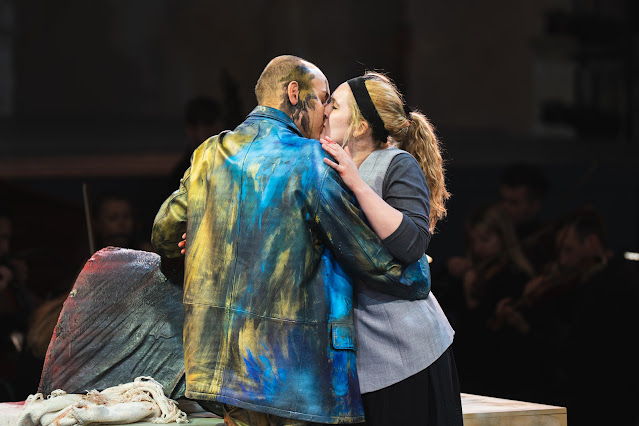 |
| Handel: Semele – Michael Lafferty, Hilary Cronin – Waterperry Opera Festival (Photo: Jennifer Hawthorn) |
It was a tight and small cast, with many of the smaller roles being doubled with the chorus, but quick changes and clear delineation of costumes meant that there was never any confusion, and the choruses filled the space admirably. Bertie Baigent directed a small-ish band from the harpsichord, but even with a second harpsichord in the ensemble the instrument sounded undernourished and the cello was the main driver in the recitatives.
The set was abstract with a large rectangular altar the focus of attention, this lit up and helped to make sense of the libretto’s various descriptions of different altars lighting up and dying. This reflected Meltzer’s attention to detail in the text, this was a simple, small-scale production yet never shirked and elements of the plot, nor did Meltzer try to impose an alternative dramaturgy on the pieces [as Oliver Mears did at Covent Garden, recently, see my review]. Rather admirably they took the story at face value, including the ending where Apollo (James Micklethwaite) comes down and announces the birth of Bacchus, leaving us to make the connections.
Handel never staged works with substantial polyphonic choruses and a piece like Semele remains a challenge on the modern operatic stage. Alexandria McCauley’s movement in the choruses felt like an admirable extension of the drama rather than something imposed to keep the stage busy whilst the singing happened as can sometimes be the case.
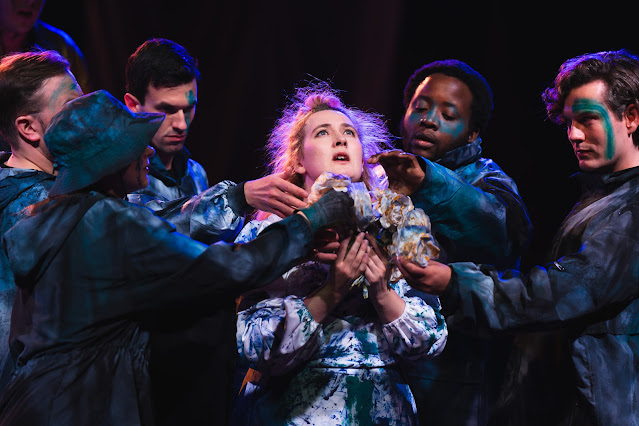 |
| Handel: Semele – Hilary Cronin & ensemble – Waterperry Opera Festival (Photo: Jennifer Hawthorn) |
Meltzer made Michael Lafferty’s Jupiter rather more present than usual. During the overture we watched Hilary Cronin’s Semele make offerings on the altar of Jupiter and get a response in the form of an eagle – cast members bringing on models in a way that was both amusing and apposite. Finally, Lafferty’s Jupiter himself appeared so that her ravishment by the god later in the act did not feel out of the blue. This continued in the opera and then at the end, during the final chorus, we saw Lafferty’s Jupiter ask forgiveness from Sophie Goldrick’s Juno in a gesture remarkably similar to Mozart’s Le nozze di Figaro.
Though the comic elements were present in the production, Meltzer and her cast rather took everything at face value. Certainly, Sophie Goldrick’s Juno did not play up the comedic element in her part (and I still remember Marilyn Horne in the role and the way she could bend a single note of the recitative to comic effect), and there was no doubling of Juno and Ino. When Juno appeared as Ino, we saw Goldrick (as Juno) controlling and ventriloquising Sarah Winn’s Ino, which was far more troubling and less comic than perhaps Handel intended.
Hilary Cronin made an engaging Semele, far less of an air-head than usual. There was no attempt to change the dramaturgy, Cronin simply brought other elements of the role into focus. Her way with the music was everything we could have wished, so that ‘Endless pleasure’ was a real delight for passagework that combined accuracy with charm. Cronin had no effort filling the auditorium with ravishing delight. ‘Myself, I shall adore’ was intriguingly done, at first Cronin’s Semele was laughing, not believing and it took a magic gesture from Goldrick’s Juno to make her look in the mirror and be captured. The regret later in the act was well done, and throughout the second two acts, Cronin managed to suggest that Semele rather than being a stupid airhead, was bored and restless because she wasn’t stupid. All this would not have worked without her engaging personality. There was one other admirable element. Despite the vagaries of an auditorium not really geared up to small scale Baroque opera, Cronin managed to get a remarkable amount of the words over.
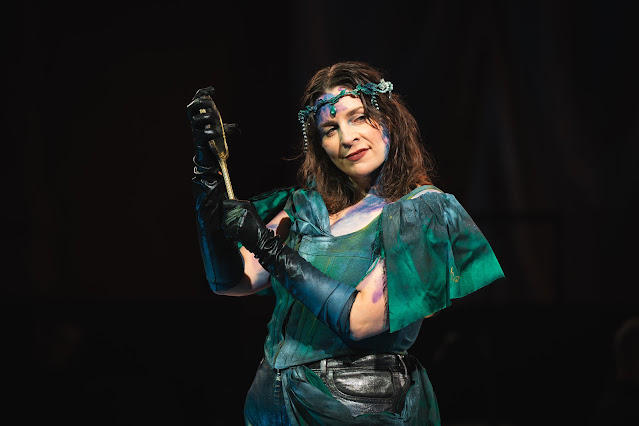 |
| Handel: Semele – Sophie Goldrick – Waterperry Opera Festival (Photo: Jennifer Hawthorn) |
Michael Lafferty made a roguish, slightly bad-lad feeling Jupiter. He was out for some fun, did not want to get caught yet tried to treat his Semele fairly – with the emphasis on ‘his’. ‘Where’er you walk’ was finely done, without ever quite ravishing, and towards the end you did not feel his regret went that deep so that the accompanied recitative ‘Ah, whither is she gone’ was touching but not that moving.
Sohie Goldrick made an admirable Juno. Goldrick was clearly having great fun, and alert to the felicities in Congreve’s text even if her interpretation as something of a ‘bad girl’ Juno was less of a comic turn than usual. She made her first scene rather vivid, and I enjoyed ‘Awake, Saturnia, from thy lethargy!’ whilst the scene with Masimbna Ushe’s Somnus was pure fun. Yet rather pointed too. Her triumph at the end was not overdone.
Sarah Winn made a touching Ino, and Meltzer brought out the sheer confusion of the love triangle that Handel and Congreve depict (Ino – Athamas – Semele) with Meltzer making the action match Handel’s music more than Congreve’s words. The result was a fine, serious dramatic performance from Winn and when she is transported to her sister’s new abode she was rather less the wide-eyed idiot than usual. The sisters might be taken advantage of by the gods, but they weren’t stupid. And the rather Purcellian duet with Cronin at the end of Act Two was everything you wanted.
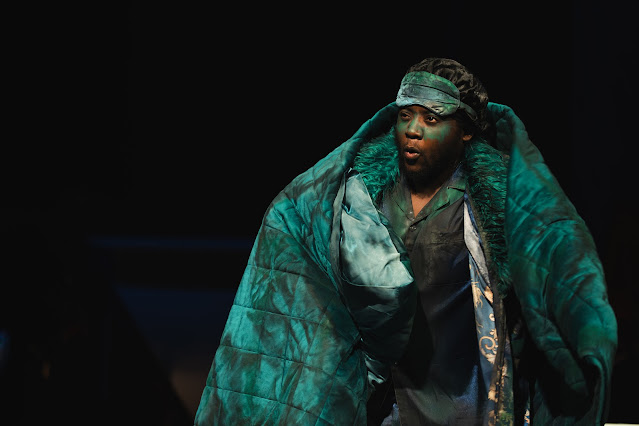 |
| Handel: Semele – Masimba Ushe as Somnue – Waterperry Opera Festival (Photo: Jennifer Hawthorn) |
Nathan Mercieca was a bit of a nice boy drip as Athamas, never quite sure which
sister he was in love with. Mercieca has quite a soft-grained voice and
there was never anything heroic, yet it made the sound appealing. Masimba Ushe made an impressive High Priest, rocking a stylish pair of very wide, baggy trousers, and then turned in a lovely comic turn as Somnus. Meckler made the set’s lack of a bed almost a virtue, as Ushe made Somnus so desperate for sleep he simple bedded down on the floor. Unlike at Covent Garden, this Somnus’ devotion to Passiphea was touching rather than scary.
Phil Wilcox (who did not as often happens double Somnus) was a sober, disciplined Cadmus. Puzzled by his daughters rather than anything worse. Louise Fuller brought everything to Iris, make her recitatives telling and working up the comedic possibilities of this role, and this Iris was definitely put upon by Goldrick’s Juno. And we got Apollo, with James Micklethwaite (who had been singing tenor in the choruses) suddenly appearing in an outfit clearly stolen from Tina Turner and making the lieto fine work well.
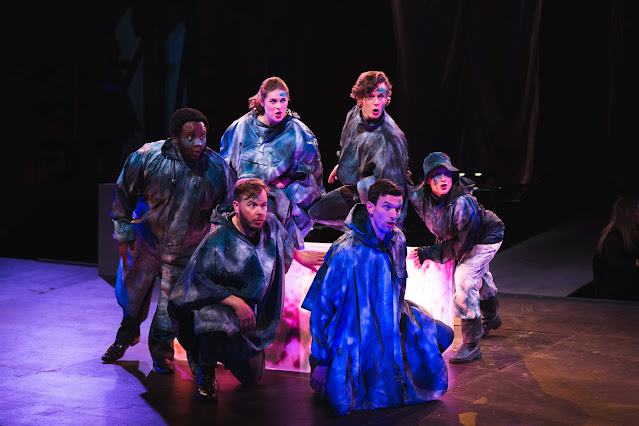 |
| Handel: Semele – Waterperry Opera Festival (Photo: Jennifer Hawthorn) |
In the pit, the small ensemble was wonderfully lithe and alert under Baigent’s direction. They managed to fill the auditorium, and his speeds were suitably lively yet there was never feeling that he was driving along, we never felt that ‘look how fast we can sing this passagework’.
The blog is free, but I’d be delighted if you were to show your appreciation by buying me a coffee.
Elsewhere on this blog
- BBC Proms: A performance to treasure as Fabio Luisi & the Danish National Symphony Orchestra celebrate their centenary – concert review
- The sound of Carnival: Eversely Mills the band manager of Metronomes Steel Orchestra on sounds and traditions of steel bands – interview
- Le Carnaval de Venise by Campra: Colombian soprano Julieth Lozano gets into the spirit of the carnival for circus opera – guest posting
- Salzburg Festival
- Astonishing kinetic musical theatre: Donizetti’s Maria Stuarda from Ulrich Rasche with Lisette Oropesa & Kate Lindsey – opera review
- Travelling hopefully: defying age & ill health, Daniel Barenboim conducts his West-Eastern Divan Orchestra – concert review
- Youthful tragedy & transcendental mystery: Riccardo Muti & Vienna Philharmonic Orchestra in Schubert & Bruckner – concert review
- Strange & intriguing: Dmitri Tcherniakov directs his first Baroque opera with Handel’s Giulio Cesare – opera review
- Going where no other company has dared: Green Opera gives the stage premiere of Joubert’s Jane Eyre at Grimeborn Festival – opera review
- New challenge & new repertoire: trumpeter Matilda Lloyd her new disc, Fantasia, pairing contemporary pieces with Baroque – interview
- I Shall Hear In Heaven: Tama Matheson impressively incarnates Beethoven with music alongside the spoken word – music theatre review
- Home








